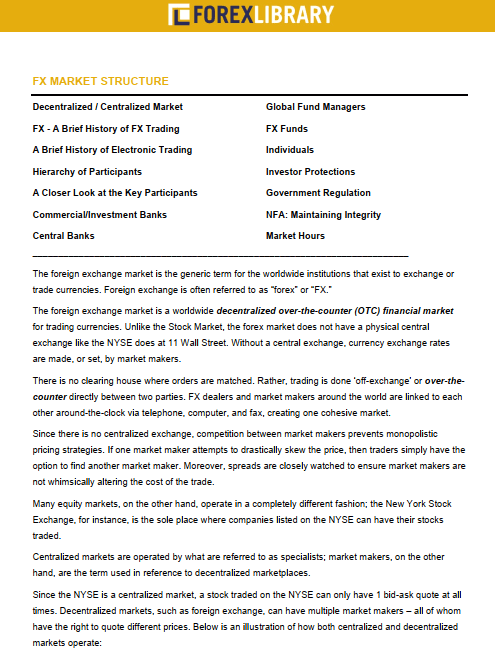The Forex Library- Forex for beginner [PDF] is designed to provide new traders with a complete foundation in forex trading, from market history to practical strategies. Unlike other guides that jump straight into charts, this ebook begins by explaining the structure of the FX market, the role of central and commercial banks, and how global participants—from institutions to individuals—shape currency movements.
Introduction
Learning how the foreign exchange market operates is the first step for anyone who wants to trade currencies successfully. The The Forex Library- Forex for beginner PDF is designed to provide new traders with a complete foundation in forex trading, from market history to practical strategies. Unlike other guides that jump straight into charts, this ebook begins by explaining the structure of the FX market, the role of central and commercial banks, and how global participants—from institutions to individuals—shape currency movements.
Inside, you’ll explore the evolution of forex, from the Bretton Woods system to today’s decentralized, electronic trading environment. You’ll also gain insights into how different market participants, including central banks, hedge funds, and retail traders, interact and influence price action. Clear explanations of concepts like market hours, liquidity, spreads, and regulation make it easy for beginners to understand how the system works.
What makes the The Forex Library- Forex for beginner PDF stand out is its balance between history, theory, and real-world application. By the end of the guide, you’ll not only know how the forex market functions but also be better prepared to approach trading with realistic expectations, discipline, and confidence.
Excerpts
The foreign exchange market is the generic term for the worldwide institutions that exist to exchange or trade currencies. Foreign exchange is often referred to as “forex” or “FX.”
The foreign exchange market is a worldwide decentralized over-the-counter (OTC) financial market
for trading currencies. Unlike the Stock Market, the forex market does not have a physical central
exchange like the NYSE does at 11 Wall Street. Without a central exchange, currency exchange rates are made, or set, by market makers.
There is no clearing house where orders are matched. Rather, trading is done ‘off-exchange’ or over-thecounter directly between two parties. FX dealers and market makers around the world are linked to each other around-the-clock via telephone, computer, and fax, creating one cohesive market.
Since there is no centralized exchange, competition between market makers prevents monopolistic
pricing strategies. If one market maker attempts to drastically skew the price, then traders simply have the option to find another market maker. Moreover, spreads are closely watched to ensure market makers are not whimsically altering the cost of the trade.
Many equity markets, on the other hand, operate in a completely different fashion; the New York Stock Exchange, for instance, is the sole place where companies listed on the NYSE can have their stocks traded.
Centralized markets are operated by what are referred to as specialists; market makers, on the other hand, are the term used in reference to decentralized marketplaces.
Since the NYSE is a centralized market, a stock traded on the NYSE can only have 1 bid-ask quote at all times. Decentralized markets, such as foreign exchange, can have multiple market makers – all of whom
have the right to quote different prices. Below is an illustration of how both centralized and decentralized markets operate:
By their very nature, centralized markets tend to be monopolistic: with a single specialist controlling
the market, prices can easily be skewed to accommodate the interests of the specialist, not those of the traders. If, for example, the market is filled with sellers from whom the specialists must buy from but no prospective buyers on the other side, the specialist will be forced to buy from the sellers and be in a situation where they cannot sell a commodity that is being sold off and hence falling in value. In such a situation, the specialist may simply widen the spread, thereby increasing the cost of the trade and preventing additional participants from entering the market. Or, specialists can simply drastically alter the quotes they are offering, thus manipulating the price to accommodate their own needs.
